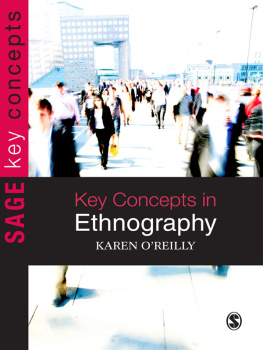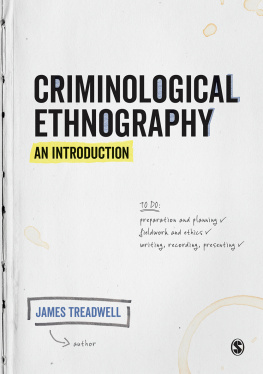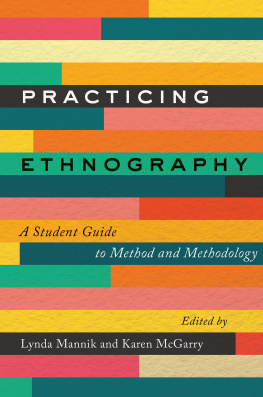Ethnographic Methods
This new edition of Karen OReillys popular Ethnographic Methods provides a comprehensive and accessible introduction to the technical, practical and philosophical issues that arise when employing traditional and innovative research methods in relation to human agents.
Using a wide range of case studies and source material to illustrate the dilemmas and resolutions that an ethnographic researcher may encounter, this textbook guides the reader from the initial design and planning stages through to the analysis and writing up. It explores the historical and philosophical foundations of ethnographic research and goes on to cover a range of relevant topics such as participant observation, qualitative interviews, (focus) group interviews and visual data collection and analysis.
Following substantial revision and updating, the second edition includes new discussions of emerging practices such as reflexive ethnography and autoethnographic accounts, as well as an entire chapter dedicated to new directions in the field including virtual, mobile, multi-sited and global ethnography.
Karen OReilly is Professor of Sociology at Loughborough University, where she teaches tourism, migration and advanced ethnographic methods.
Ethnographic Methods
Second edition
Karen OReilly
First published 2005
Second edition published 2012
by Routledge
2 Park Square, Milton Park, Abingdon, Oxon, OX14 4RN
Simultaneously published in the USA and Canada
by Routledge
711 Third Avenue, New York, NY 10017
Routledge is an imprint of the Taylor & Francis Group, an Informa business
2005, 2012 Karen OReilly
The right of Karen OReilly to be identified as the author of this work has been asserted by her in accordance with sections 77 and 78 of the Copyright, Designs and Patent Act 1988.
All rights reserved. No part of this book may be reprinted or reproduced or utilised in any form or by any electronic, mechanical, or other means, now known or hereafter invented, including photocopying and recording, or in any information storage or retrieval system, without permission in writing from the publishers.
Trademark notice: Product or corporate names may be trademarks or registered trademarks, and are used only for identification and explanation without intent to infringe.
British Library Cataloguing in Publication Data
A catalogue record for this book is available from the British Library
Library of Congress Cataloging in Publication Data
OReilly, Karen.
Ethnographic methods / Karen OReilly.
p. cm.
Includes bibliographical references and index.
1. Ethnology Philosophy. 2. Ethnology Comparative method.
I. Title.
GN345.O72 2011
305.8001 dc23
2011018382
ISBN: 978-0-415-56180-8 (hbk)
ISBN: 978-0-415-56181-5 (pbk)
ISBN: 978-0-203-86472-2 (ebk)
Contents
Preface to the second edition
I agreed to write a second edition of this book thinking it would not involve much more than a bit of updating. However, the field has developed to such an extent that the revisions and modifications I have made and the developments I have discussed have resulted in a much more extensive revision than I had imagined at the outset. It has been exciting work. Relatively little was published in the field of qualitative methods, still less ethnographic methods, when I prepared the first edition. Especially in anthropology, there was an implicit understanding that writing about methods was somewhat banal, inferior to other things academics should be doing, and certainly tedious. In the past few years, this situation has changed to such an extent that at times I felt completely overwhelmed with material. Textbooks, specialist literature, disciplinary tomes, analytical and descriptive articles, debates, new approaches and innovative methods abound as authors find ever new ways to make the same (or similar) argument in such a way as to warrant yet another publication. I therefore sympathise with students, and those new to ethnography, who have to find some way of filtering this mass of material for their own purposes.
Nevertheless, I believe this book can offer something unique because my work is theoretically informed yet accessible. It is interdisciplinary, based on many years of using and adapting ethnographic methods in diverse settings, and on teaching the approach to students with very diverse disciplinary backgrounds, from all over the world. I am both a sociologist and a social anthropologist, whose work also overlaps with human geography and politics. I have applied ethnography in a fairly conventional way to undertake a 15-month community study of British people living in Spain, and a year-long in-depth analysis of change and continuity in an English town; and I have used ethnographic methods more flexibly in shorter periods in schools, business organisations, at public events and in private settings, through the use of ethnographic, life-story, and email interviews, the analysis of weblogs (blogs) and more. Finally, as a sociologist, my approach to ethnography is heavily informed by social theory, especially theories of practice (see ).
The second edition has made a few changes to which I would like to draw readers attention. Overall the book is much longer, with many more recent examples and illustrations; arguments, debates and references have been updated; now introduces William Foote Whytes Street Corner Society as an example of a Chicago School style of ethnography. The discussion of contemporary uses of ethnographic methods now introduces the notion of reflexive practice, and specifically covers developments in health and medicine, human geography and education. Several of the key principles of ethnographic practice are introduced here.
introduces the notion of guiding theoretical problems that inform iterative-inductive research and provides examples of these. There are plenty of references for readers to pursue for examples of inductive research questions and design, and for the role of the literature review in ethnographic research. I have included an extended discussion of sampling strategies. The section on philosophies of social science has been updated and expanded and linked more overtly to ethnographic methods; it is summarised with the use of Key ideas and includes a clear statement of my own position: that many of the debates about philosophy are resolved through ethnographic practice and that the role of philosophy is as under-labourer not master builder.
is little changed, but examples and debates are brought up to date and more case studies are used to bring it all to life. This chapter has made some special consideration of ethical issues for virtual, sensual, critical and autoethnographies. I have also included some discussion of the ethics of ethical committees and reflected on issues of embodiment, field relations, power and engagement. I end the chapter with a clear statement of my own ethical position: that ethical dilemmas must be resolved on a case-by-case basis as ethnography takes place. Ethical research is therefore an essential and ongoing component of ethnographic practice.
The advantage of up-to-date examples and case studies and has been updated in line with recent debates about reflexivity, insider ethnographies, field relations, and the embodied practice of ethnography. I have also extended the chapter with some discussion of rapport, intimacy and conflict, teamwork, and much more on note-taking. I cover field-walking, the role of participation in contemporary ethnography, and the limits of ethnography. The discussion about the participant observation continuum has been reworked into a discussion about the useful and essential dialectic of participation and observation.







